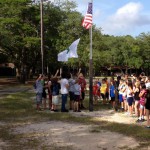
by Kendra Hughson | May 5, 2017

Family rituals and traditions, like family vacations, make lasting memories.
This will be my sixth Mother’s Day, so I am not an experienced mother by any stretch of the imagination. As a Family and Consumer Sciences Extension Agent, I am fortunate to have plenty of coursework and some practical experience in working with children– but real life is different. Here are a few of the things I have learned – from coursework and just a little bit of experience:
Every stage of childhood brings a new joy and a new challenge. Understanding child development can help parents know what to expect and how to handle challenges. Extension is a great resource for child development. We have fact sheets on all ages and stages of development. You can find them in our Electronic Data Information Source (EDIS) publications. Search them here: http://edis.ifas.ufl.edu/topic_child_development
Finding effective discipline techniques and sticking to them also is a challenge. Children need consistency. I have found that focusing on good behavior and having clear, consistent rules makes life much more peaceful. Now that my child is in school, we use a simple chart with just two or three items and use colored dots, similar to what my daughter is used to in school. This keeps it consistent and focused on the positive behaviors I want to see. My daughter is excited to earn privileges and the reward of good behavior dots or stickers. Our UF/IFAS Extension site has some great ideas for discipline too. Find them here: discipline resources.
Children need routines. I think adults do, too. Having a routine and sticking to it helps children know what to expect. Those family rituals and traditions are just as important for building family stability and a sense of belonging. They make for great family memories! Don’t forget to make time for bedtime stories, making cookies, or for family celebrations, like Mother’s Day.
I am not an expert at parenting. I have made mistakes, some big, some little. When I do need expert advice, I go back to what I have learned from my work in Extension. Extension has all the research-based information you can trust on parenting and a variety of other topics. Check it out: edis.ifas.ufl.edu.
by Heidi Copeland | Nov 30, 2016
 Many of us can agree, being around family can make simple things in life more special! Whether it’s time spent together during holidays, celebrating birthdays, or simply enjoying togetherness, family events can make life memorable. Why wait until special occasions to show your family that they matter? Dining together can make simple things feel special every day!
Many of us can agree, being around family can make simple things in life more special! Whether it’s time spent together during holidays, celebrating birthdays, or simply enjoying togetherness, family events can make life memorable. Why wait until special occasions to show your family that they matter? Dining together can make simple things feel special every day!
Dining in with your family is one of the easiest ways to incorporate spending quality time together… on a daily basis. Knowing that schedules can make this task very difficult to implement but understanding the benefits will help encourage us to make the time for this important ritual. Research studies show that frequent, positive mealtime experiences can lead to better communication among family members, improved performance at school, and enhanced reading levels, as well as better overall nutrition. During meals, parents are able to teach their children how to actively listen and express themselves through conversation. As a result, these mealtime conversations expand children’s vocabulary and increase their reading skills. Equally important is that eating together helps encourage healthy eating habits.
Make plans to set aside December 3, 2016 as Dine in Day. This initiative, started three years ago by the American Association of Family and Consumer Sciences (AAFCS) promotes the importance of group meals in fostering family and community relationships, encouraging healthy diets and stretching food dollars. AAFCS cares about family mealtimes and is spreading awareness.
Here are some Dine In Day conversation starters and tips to create an enjoyable and relaxing atmosphere for your family:
- Start with minimal distractions. Turn off all devises…televisions, iPads, laptops, and set aside cell phones.
- For families with preschoolers here are some conversation starters
- If you could be any animal in the world for a day, which animal would it be? Why?
- What made you happy (or sad) today? Why?
- Who did you sit next to (or play with) at school today? What did you talk about?
- Would you like to help plan dinner for tomorrow night? What foods would you like to help cook for dinner?
- For families with adolescents and young adults here are some conversation starters
- Ask about their hobbies, clubs, or extracurricular activities
- If you could have one day free of all responsibilities what would you do?
- Share funny stories and discuss light current events
Remember, eating together matters. Try to create a positive atmosphere before and during meals.
- Respect and involve every family member giving everyone an equal opportunity to share an opinion without teasing or criticizing.
- Download free conversation starters at www.school-wellness.org
- Background music can be a nice addition!
Individuals, families and groups can pledge to dine in December 3 at http://bit.ly/2dPj58G . Diners can also participate on social media by sharing photos and using the hashtags #FCSdayFL and #healthyfamselfie.
Build stronger relationships and positively impact your children’s growing values. Don’t wait until special occasions to reap the dining together benefits, dine in now!
For more information on the importance of family meal
- Lyttle and E. Baugh, The Importance of Family Dinners (FCS2286), Department of Family, Youth and Community Sciences (Archived).
- Paredes and K. Shelnutt, Raising Healthy Children: The Importance of Family Meals (FCS8925), Department of Family, Youth and Community Sciences (06/2010).
Tamarah Ulysse FSU Intern, Family and Child Sciences
Edited by: Heidi Copeland
Extension Agent I
Family and Consumer Sciences
615 Paul Russell Road
Tallahassee, FL 32301-7060
850/606-5200
by Ginny Hinton | Jul 25, 2015

Young boy drinking a glass of milk
It may be hard to believe, but summer vacation is drawing to a close and school is right around the corner. It’s time to plan for lots of things like new classrooms and teachers, unexpected supply needs, extracurricular activity requests – and hungry kids arriving home from school.
Although it’s easy to succumb to the appeal of ready-made, processed snacks, it can be just as easy and inexpensive to offer healthy but delicious options in single-serve sizes. Following are some quick and simple suggestions:
- Store sliced veggies in the refrigerator and serve with hummus or low-fat ranch dressing.
- Mix dried fruit, unsalted nuts and popcorn in a snack-size bag for a healthful trail mix.
- Wrap sliced, low-sodium deli meats like turkey or ham around an apple wedge.
- Store hard-boiled eggs in the refrigerator for kids to grab any time.
- Purchase fresh, frozen, dried or canned fruits for easy “grab-and-go” options.
- Offer a single serving of individually wrapped string cheese or low-fat yogurt.
- Add club soda to a ½ cup of 100% fruit juice for a tasty alternative to soda.
With just a bit of advanced planning, it’s a snap to halt the snack stampede and wind up with satisfied and healthier school-age kids!
Please click here to answer a few questions to help us better serve you.
by Elizabeth | Aug 6, 2014

Vaccines are responsible for the control of many infectious diseases that were once common in worldwide.
Make sure that your family and friends are up-to-date on their immunizations. With children enrolling in or returning to school, older students entering college, and adults and the health care community preparing for the upcoming flu season, this is a particularly good time to focus community attention on the value of immunization.
Vaccines are responsible for the control of many infectious diseases that once were common worldwide. Vaccines have reduced and, in some cases, eliminated many diseases that once routinely killed or maimed tens of thousands of infants, children and adults.
The viruses and bacteria that cause vaccine-preventable diseases and death still exist and can infect people who are not protected by vaccines. Vaccine-preventable diseases have a costly impact, resulting in doctors’ visits, hospitalizations, and premature deaths. (Sick children also can cause parents to lose time from work.)
Now, suppose you could make your child safe from some of the deadliest diseases in history and suppose that, at the same time, you also could help protect your neighbors’ children and other children around the country from the same diseases. Finally, suppose you could actually help to rid the world of some of these diseases that have been crippling and killing children for centuries.
You can do all of these things with one of the easiest and, yet, most powerful health tools ever developed. You can make sure your children get their shots.
There are 12 potentially serious diseases that vaccines protect against:
- Diphtheria,
- Haemophilus Influenza Type b (Hib)
- Hepatitis A
- Hepatitis B
- Measles
- Mumps
- Pertussis (Whooping Cough)
- Pneumococcal disease
- Polio
- Rubella (German Measles)
- Tetanus (lockjaw)
- Varicella (Chickenpox)
At least one shot is needed for each of these diseases, and for some of them, several doses are required for the best protection.
For more information on immunizations, call your local Health Department or contact your child’s pediatrician. You also may visit the CDC website at http://www.cdc.gov/vaccines/schedules/easy-to-read/child.html.
by Melanie Taylor | Jun 2, 2014

Summer camp teaches children independence and leadership skills.
Summer is here and summer camp is on the horizon. Maybe this is your child’s first time to an overnight camp or they are “old pros” at this thing called camp. Many parents and children will have camp anxieties, but here are some things you can do to prepare your camper and yourself for camp.
Campers:
• Plan several sleepovers before the week of camp arrives. Resist the urge to pack their bags for them or to check on them while there. If they have a cell phone, have them leave it at home. This is a good way to practice not having direct or constant contact.
• Encourage them to write a letter to someone (maybe you) while at camp. You will be so excited when you receive a letter from camp! Be sure to include envelopes, addresses, stamps, paper, and a pen in their luggage.
• Gear up physically. If you have purchased your camper new tennis shoes, have them break them in with a few long walks so the blisters don’t happen at camp.
• Especially for teenagers, have them take a mini-vacation from their electronic devices – a couple of hours or a weekend.
• Have them write a statement for their social media pages. “Peace out Facebook, I will be at camp for the next week. Check in with you when I get back” or something similar.
• Have them write down their goals for camp so they can mentally prepare themselves for what they hope to do and see.
• Make a homesick plan:
1. Homesickness isn’t entirely bad. It’s great to love your home. It’s sometimes part of the process and it’s a confidence-booster when a camper gets through it.
2. Make a “happy place” plan and write it down. This is an amazing opportunity to learn a life skill. Today’s youth go to technology to escape and studies show this increases their stress. Some ideas include: taking 10 deep breaths, traveling to a “happy place” in your mind, packing a certain stuffed animal, or tossing a football. Children are capable of this independence.
3. Your plan should NOT be, “Give it a couple of days and if you don’t like it, we will come get you.” This will set them up to give it a couple of days and knock the confidence right out of them.
4. Let your camper know what to expect with correspondence. You don’t need to write every day but let them know what to expect.
Parents:
• You are giving your child an incredible gift. I cannot promise you they will not lose some socks, they will love every meal or activity, and they will adore every staff member. But you are preparing them for college and beyond; you are giving them the freedom to gain confidence, independence, and leadership skills; and you are instilling in them that they can do it.
• What do YOU want to do during their time at camp? Plan a vacation for a later time, organize the house, or enjoy one-on-one time with your other children or some “date nights” with your spouse or friends.
• If you have apprehensions, work to resolve them. If you are worried your camper is not going to know anyone, set up a pre-camp get-together. If you are worried about your camper’s medical needs, become friendly with the camp staff. If you are anxious about their food allergies, talk to the camp’s director. Make a camper-sick plan for yourself. Make sure there is only excitement and optimism coming from you; share your anxiety with another adult.
• Pack self-addressed stamped envelopes in their luggage.
• Whether they are flying or driving, hold off on crying your eyes out until they cannot see you. Take a deep breath, trust, and remind yourself you are giving them an awesome gift.
And just what is this gift everyone is talking about? At camp, they will be part of a community all their own. They will become emotionally attached to handmade rope bracelets on their wrist, and have a song for any occasion on cue, and maybe even forget they need to shower, and think sunscreen is just a normal daily moisturizing technique. They will learn to do things on their own and they’ll learn to rely on others. They will learn how to survive on their own for a week or two and they’ll learn how to help each other through it.
They may even grow up on summers away from TV and forget Facebook exists. They will relish the joy of sleeping in cabins, swatting mosquitoes at campfire, and swimming every day. They will savor the feeling of pushing water behind them with a paddle and the whoosh of air behind the tail of an arrow as they fire. They’ll forget about appearances, relish tan lines, and recognize the beauty of a smile over anything else.
So send your kids to camp. Send them so they’ll learn to set tables and make beds and wake early. Send them so they’ll know how to be a leader, paddle a kayak, weave a bracelet, and sing as loud as they can. Send your kids to camp so they’ll learn to love themselves and learn to love others. Send your kids to camp because they’ll realize who they are – or who they want to be. And, prepare yourselves for a year of camp stories and for a flurry of songs. Prepare to learn names of kids you’ve never met. And for your kids to have a need for sunshine, campfires, and companionship. They will be forever grateful for your awesome gift of summer camp.
Source:
American Camping Association, Inc. (http://www.acacamps.org)






